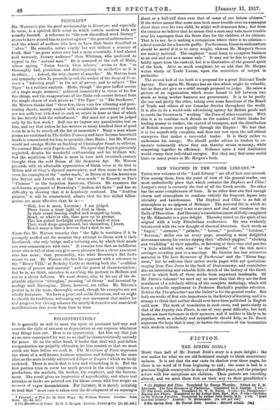FICTION.
THE SPRING SONG.t MORE than half of Mr. Forrest Reid's story is a pure delight : the rest makes for what we are old-fashioned enough to think unnecessary sadness. It is not that the war casts its shadow over these pages, for there is no word of it from beginning to end ; the scene is laid in a gracious English countryside in days of unruffled peace, and the principal actors with few exceptions are children. Their parents are travelling abroad, and we meet them first on their way to their grandfather's
• (1) Daphnis pid Chios. Translated by George Thornley. Edited by I. 11. Edmonds. The Loos Romances of Parihenius. Translated by S. Casette. 1 vol.- (2) The Greek Anthology. Translated by W. R. Paton. c cols.—(3) Theophrastui Inquiry into Plants. Translated •by Si; Arthur Hort, Bart., M.A. 2 vols.—(4) Galen on the Natural Faculties. Translated by Arthur John Brock, M.D. 1 vol. "Loeb Classical Library." London : W. Heinemann. [5s. net per vol.) t The Spring Song. By Forrest Reid. London : Edward Arnold. [ r44 house—two little girl; with their governess, two small boys, and a most engaging bulldog, On their arrival they are joined by a school- boy brother—for it is summer-holiday time—and his school friend- The grandfather is an. old Canon, scholarly, humorous, detached, who is engaged on a great work on Folk-Lore, and shuts his eyes to the disagreeables of life, and the house is " run " by his unmarried daughter, a capable, kindly, but unimaginative young woman. The house is comfortable, the country ablaze with the pageant of summer, the neighbours friendly, and all the auguries point to a glorious time for the young people. And a glorious time they all had, in spite of their fussy governess, all save " Grif," the middle brother of the three, a delicate, sensitive, imaginative child, a dreamer to whom the trees and winds were living presences and the aura of the old house full of strange appeals. Not that " Grif " was unhappy to begin with, or that he was unkindly treated by his brothers or sisters. They were fond of him, but they did not understand him, and let him go his own way. And his way was that of the child in George Macdonald's fantasy, At the Back of the North Wind, and to some extent that of " Jimbo " in Mr. Algernon Blackwood's romance. He held commune with fairies in his dreams, he walked in his sleep and went off on long rambles by himself, and made friends desirable—like the charming old Captain Narcissus Batt and his sister—unconventional, and in one instance, that of the crazy organist, undesirable and even fatal. For the organist was not only a homicidal maniac, but a human vampire, who poisoned the child's imagination, and . peopled his fairyland with monstrous shapes of fear and horror. The story of the clouding of an innocent but highly strung mind is not as horrible as that of The Two illagics, but it is painful. The sufferings of children are hardly fair game for fiction, and though the sinister figure of the organist is ultimately removed, his influence abides, and is only cast out for a very brief interval before " Grif " finds rest in the- sleep that knows no waking. Life is made up of alternations of comedy and tragedy, but we rather resent the literary presentation of this fact in a form which lays the burden on innocent childhood and casts a sudden chill on its golden days. " Children are a heritage of the Lord," as the Psalmist says, but we do not care to think that " He giveth His beloved sleep" as a respite from undeserved mental anguish. One of the few great solaces that are left to us in these dark home is the immunity from sorrow enjoyed by children, and it is hard not to feel a little resentful when the Paradise of youth is represented as subject to malign and sinister influences. And we regret it all the more because Mr. Forrest Reid'a children are for the most part so de- lightfully human and natural and happy ; and none is more engaging than " Grif " himself. The account of their games and quarrels, their indiscretions and extravagances, is quite enchanting, and the scene in which they act a dramatized version of the melodramatic novel written by- their governess, bite of- which the author had rashly told them, reaches a level of delirious fun. The young amateur detective is perhaps• a trifle precocious, but he is none the less a very interesting study. We should like to hear more of Palmer Dorset, who was, after Miss Nancy Batt, " Grit " most helpful friend.



























 Previous page
Previous page